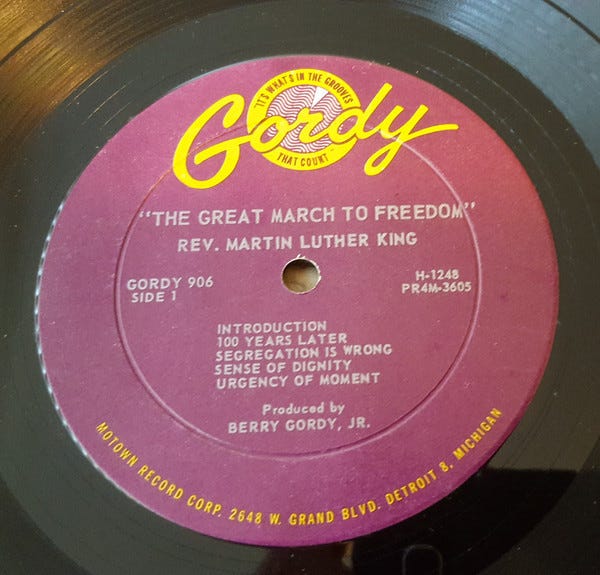Tributes to a King
Looking back at the Billboard/music biz response to Dr. King's assassination
Fifty-five years ago today, the Rev. Dr. Martin Luther King Jr. was assassinated in Memphis, Tennessee. The Lorraine Motel, where he was killed, was a regular hangout for musicians from the nearby Stax Records, but Dr. King’s associations with the recording industry went much deeper than that. Many of his sermons had been released on vinyl during the half-decade before his death, including The Great March to Freedom, a compilation of his speeches released in 1963 by the Motown Records subsidiary Gordy.
Dr. King and his crusade for Civil Rights also received the staunch support of numerous high-profile recording artists of the day, including Mahalia Jackson, Harry Belafonte, Lena Horne, Sammy Davis, Jr, Odetta, Joan Baez, Bob Dylan, and Sam Cooke, whose powerful 1964 anthem “A Change is Gonna Come” was at least partly inspired by Dr. King’s “I Have a Dream” speech. And, of course, numerous musical tributes would be waxed in the wake of his death, including Dick Holler’s oft-recorded “Abraham, Martin and John”. (Dion had the big hit with it, but I kinda prefer the Smokey Robinson & The Miracles version.)
Dr. King’s death was the rare non-musical event that was major enough to receive multiple mentions in Billboard magazine — both because of its negative retail impact due to the subsequent riots across the country, and because by 1968 the majority of the record biz was, if not outright supportive of the Civil Rights cause, at least cognizant that the violent death of the movement’s pre-eminent leader was something deeply relevant to artists, consumers and business folks alike. So I found it interesting to look back at the Billboard issues that immediately followed his death, and see how it was reflected in both the trade publication’s coverage and the ads that various record companies took out in it. I’ll post some examples here, along with a few other ads from these issues that seem pretty apropos to what was happening at the time.
The April 13 issue was the first to hit the stands in the aftermath of Dr. King’s death. The Billboard editors included this statement on the front page, but aside from it and a 20th Century Fox ad hawking their new release of the “I Have a Dream” speech, there’s no mention of him in the issue. Great ad for Bobby Taylor and the Vancouvers’ interracial dating lament, though…
There’s far more King-oriented coverage in the April 20 issue, including several articles recounting damage to record shops from the riots, and how some local radio stations attempted to keep their listeners off the streets.
The above ad thanks James Brown for flying to DC on April 6 — at the request of Mayor-Commissioner Walter Washington — and speaking out against rioting via live broadcasts from local TV and radio stations. (The Godfather had already cooled things out in Boston the previous night with the live broadcast of his concert at the Boston Garden.) Then, of course, you get the ads from record companies already jumping into the market with new MLK-related product, and at least one entertainment organization making it “all about them”…
Meanwhile, The Impressions are rolling on, because “we cannot stop until we reach that mountain top”.
Here’s some additional coverage and ads from the April 27 issue. Interesting to see The Wind in the Willows, a folk-psych group featuring a young Debbie Harry, playing a benefit show at FIT for the Martin Luther King Fund.
And finally in the “Presented without further comment” department…
























Eloquent and eye-opening to those of us who only paid attention to the awful official history. By coming at it this way you expand the pain and remembrance but in doing so the grief we share and should not neatly tuck away. Thank you Dan.
This brought back memories of a sad, scary and confusing time for, then 12 year old me. Your documentation is very interesting. I hadn't realized what an important role James Brown played in diffusing the tensions in the communities.
Nice work Dan.